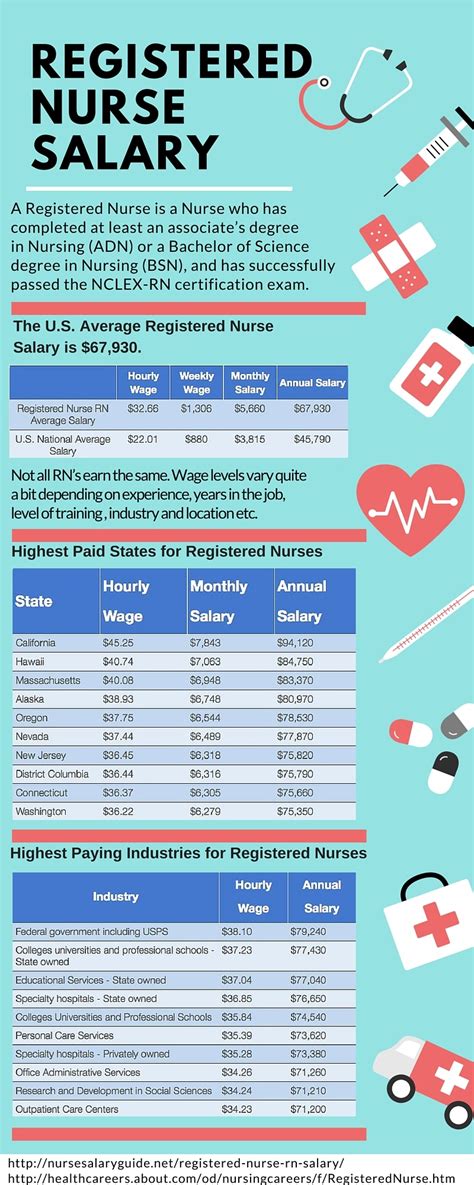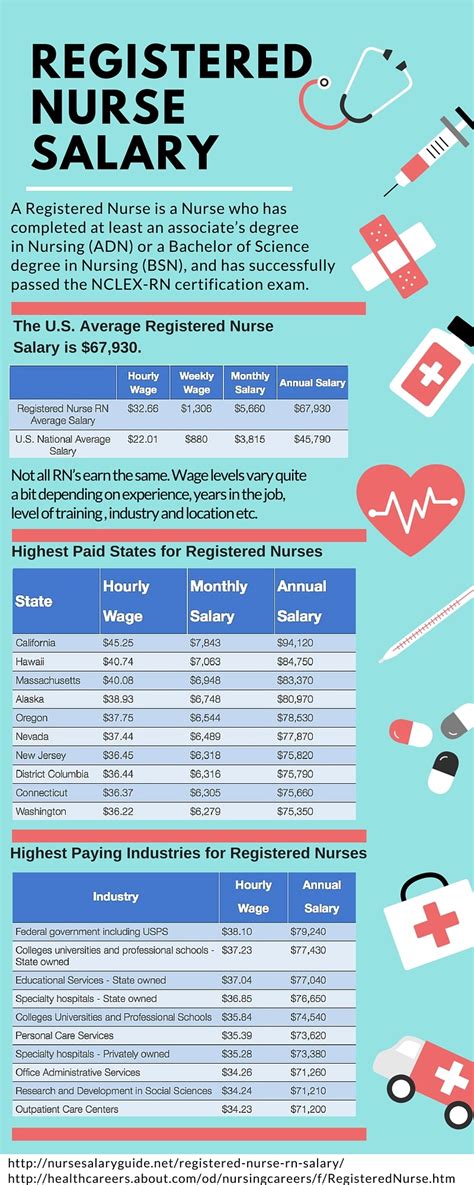Intro
Discover the latest entry-level nurse salary ranges and trends in this comprehensive guide. Learn about average salaries, hourly wages, and benefits for new nurses in the US. Explore factors influencing nurse salaries, including location, experience, and specialization, to make informed career decisions and maximize your earning potential.
As a new nurse, one of the most pressing concerns is salary. Understanding the average entry-level nurse salary can help you navigate the job market, negotiate your pay, and plan your financial future. In this comprehensive guide, we'll delve into the world of nurse salaries, exploring the factors that influence them, the average salary ranges, and tips for negotiating your pay.

Factors Affecting Entry-Level Nurse Salaries
Several factors can impact entry-level nurse salaries. Understanding these factors can help you better navigate the job market and negotiate your pay.
Location
Location is one of the most significant factors affecting nurse salaries. Cities with a high cost of living, such as New York or San Francisco, tend to offer higher salaries to compensate for the increased living expenses. On the other hand, rural areas or cities with a lower cost of living may offer lower salaries.
Specialty
Different nursing specialties can command varying salaries. For example, critical care nurses or operating room nurses may earn higher salaries due to the high level of skill and expertise required. In contrast, medical-surgical nurses or pediatric nurses may earn lower salaries.
Experience
While this guide focuses on entry-level nurse salaries, experience can still play a role. Nurses with prior experience, even if it's just a few months, may be able to negotiate higher salaries.
Education
The level of education can also impact nurse salaries. Nurses with a Bachelor of Science in Nursing (BSN) may earn higher salaries than those with an Associate Degree in Nursing (ADN).
Employer
The employer can also influence nurse salaries. Hospitals, clinics, and other healthcare organizations may offer different salaries based on their budget, location, and other factors.
Average Entry-Level Nurse Salaries
So, what can you expect as an entry-level nurse salary? According to the Bureau of Labor Statistics (BLS), the median annual salary for registered nurses (RNs) in the United States was $76,840 in May 2020. However, salaries can vary depending on the location, specialty, and employer.
Here are some average entry-level nurse salary ranges in the United States:
- Registered Nurses (RNs):
- Average starting salary: $65,000 - $75,000 per year
- Average salary range: $60,000 - $80,000 per year
- Licensed Practical Nurses (LPNs) / Licensed Vocational Nurses (LVNs):
- Average starting salary: $45,000 - $55,000 per year
- Average salary range: $40,000 - $60,000 per year
- Certified Nursing Assistants (CNAs):
- Average starting salary: $30,000 - $40,000 per year
- Average salary range: $25,000 - $45,000 per year

Negotiating Your Pay
As a new nurse, negotiating your pay can seem daunting. However, it's essential to remember that you have the power to negotiate your salary. Here are some tips to help you negotiate your pay:
- Research the market: Use online resources, such as the BLS or Glassdoor, to determine the average salary range for your position and location.
- Know your worth: Make a list of your skills, education, and experience to demonstrate your value to potential employers.
- Be confident: Negotiation is a conversation, not a confrontation. Be confident and assertive when discussing your salary.
- Be flexible: Be open to negotiation and flexible with your expectations.
Salary Negotiation Tips for New Nurses
As a new nurse, you may not have as much leverage in salary negotiations. However, here are some tips to help you negotiate your pay:
- Consider benefits: If the employer is unable to offer a higher salary, ask about benefits such as tuition reimbursement, student loan forgiveness, or flexible scheduling.
- Ask about opportunities for advancement: Show your employer that you're committed to growing with the organization and ask about opportunities for advancement or professional development.
- Be willing to compromise: Negotiation is a give-and-take process. Be willing to compromise on salary or benefits to find a mutually agreeable solution.

Conclusion
Understanding entry-level nurse salaries is essential for navigating the job market and negotiating your pay. By considering the factors that influence salaries, researching the market, and being confident in your worth, you can negotiate a salary that reflects your value as a new nurse. Remember to stay flexible, be open to negotiation, and prioritize your needs and goals.

We hope this comprehensive guide has provided you with the information and resources you need to navigate the world of nurse salaries. Remember to stay informed, stay confident, and prioritize your needs and goals.
What is the average entry-level nurse salary in the United States?
+The average entry-level nurse salary in the United States varies depending on the location, specialty, and employer. However, according to the Bureau of Labor Statistics (BLS), the median annual salary for registered nurses (RNs) in the United States was $76,840 in May 2020.
How can I negotiate my nurse salary?
+Research the market, know your worth, be confident, and be flexible. Consider benefits, ask about opportunities for advancement, and be willing to compromise. Remember to prioritize your needs and goals.
What factors affect nurse salaries?
+Location, specialty, experience, education, and employer can all impact nurse salaries. Understanding these factors can help you navigate the job market and negotiate your pay.
